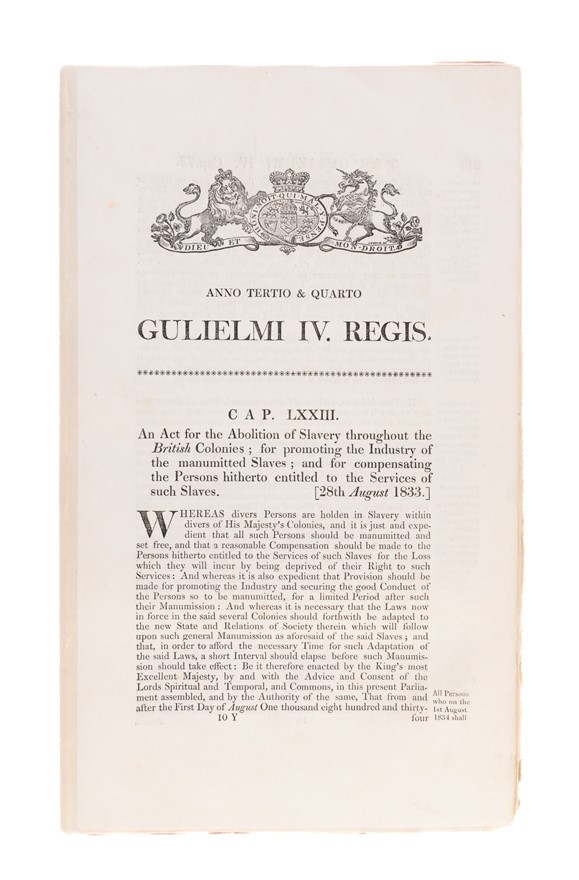An Act for the Abolition of Slavery throughout the British Colonies;
WILBERFORCE William. (1833.)
£5000.00 [First Edition]
Please contact us in advance if you would like to view this book at our Curzon Street shop.
THE EMANCIPATION ACT
for promoting the Industry of the manumitted Slaves; and for compensating the Persons hitherto entitled to the Services of such Slaves.
First edition. Small folio. Removed from a volume with a recent paper spine, some very slight foxing to final leaf. [914]-939, [1]pp. London, George Eyre & Andrew Spottiswoode,
The 1807 Act for the Abolition of Slave Trade was the first major step towards the dismantling of a four-hundred-year-old system that simultaneously enriched and shamed the British Empire. As it allowed the practice of slavery to continue in the British colonies, a host of anti-slavery associations sprung up across the country advocating for abolition at a grass roots level.
Indeed, Thomas Clarkson spent the next twenty-five years simultaneously trying to enforce the 1807 Abolition Act (the West Africa Squadron played no small part in this) while campaigning for abolition across the entire British Empire. In fact, the last time Clarkson and William Wilberforce appeared together was when the Anti-Slavery Society adopted a policy of immediate emancipation in 1830.
"After the new Parliament began meeting in 1833, antislavery forces increased the pressure, organizing a rare street demonstration in which a large, orderly crowd marched to the Prime Minister's office on Downing Street. Even the elderly Wilberforce, no fan of inflaming public opinion, was persuaded to publicly initiate a petition to Parliament ... The debate lasted more than three months, making this session of Parliament one of the longest in memory .. The triumph came at last when the emancipation bill passed both houses of Parliament in the summer of 1833 (Hochschild). " On 22 July 1833, the act passed the House of Commons on its second reading and received the Royal Assent on 28 August.
This was the culmination of William Wilberforce's life's work, which passed just three days before his death. To give an idea of the value of the slave trade to the British economy, in 1837 the Slave Compensation Act was passed for the benefit of plantation owners. The British government borrowed £20 million (about 40% of the national budget), a debt that was not fully repaid until 2015.
Hochschild, A., Bury the Chains ... (Macmillan, 2006) pp.346-7.
.
Stock Code: 246055




